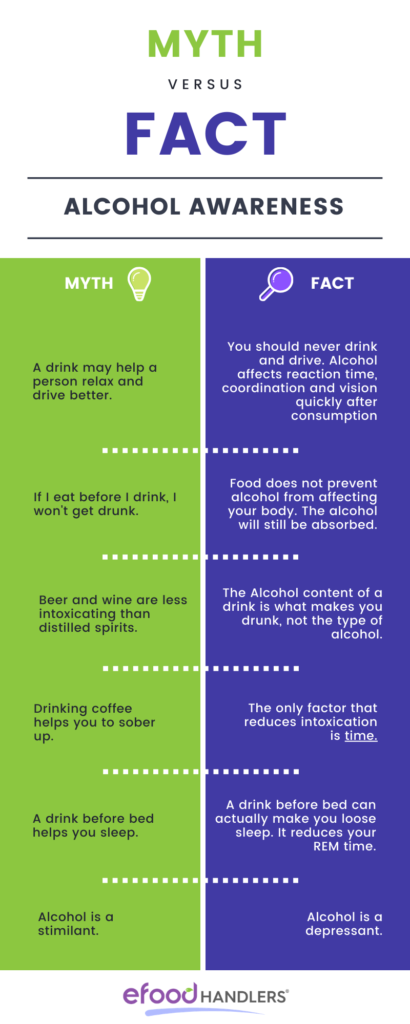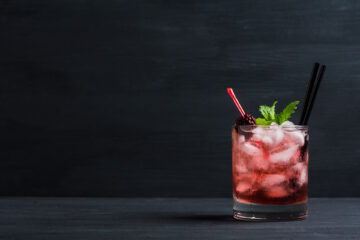Teaching the real facts of alcohol consumption is vital for public safety, so we did some digging and myth busted these urban legends with some research.
Most of them reference how to avoid a hangover or even how to cure one, but making sure you don’t fall into the trap of believing them is important for your safety and the safety of others around you. After doing some research on common myths and how they came to be, we decided to create a list for you. Here are 7 common myths about alcohol and the truth behind them.
Hair of the Dog – Having a drink when you have a hangover will cure it.
This is the biggest myth of them all! The phrase ‘hair of the dog’ actually comes from the phrase, “hair of the dog that bit you” and this came from a different urban legend that said if you were bitten by a rabid dog, you could make a potion to drink and if you added a hair of the dog that bit you, it would cure you.
Now we all know that is not true, but the phrase then turned into a metaphor for alcohol. The dog that bit you became the alcohol that gave you the hangover, so the hair of the dog became another alcoholic beverage. Drinking your way out of a hangover is no way to cure one, you are sadly just prolonging the inevitable. Only time and staying hydrated can help you cure a hangover.
Myth busted.
Alcohol is a stimulant.
Nope! Alcohol is a depressant. There are two kinds of drugs, stimulants, and depressants, and alcohol is not a stimulant.
Myth busted. Next!
Drinking coffee helps you sober up.
Again, this is not true. The only thing that sobers you up is time. According to the book “Drug Use and Abuse” by Stephen A. Maisto, Mark Galizio, & Gerard J., this myth has been around since the 17th century. People used this as a scapegoat long ago for a variety of reasons, like trying to get people to drink coffee because of its magical effects in lieu of other substances or activities, but the primary reason it was advertised as a sobering agent was due to the fact that coffee is a stimulant.
It can give the illusion of sobering you up because it gives you energy and makes you feel less tired, which is the exact opposite effect that alcohol has on the body. The truth of the matter is that even if you mix a stimulant with alcohol, you are very much still intoxicated and your Blood Alcohol Content, or BAC, has not changed. Although you may feel as though you have more energy, you are not anymore sober if you drink coffee after drinking alcohol.
Myth busted.
If I eat before I drink, I won’t get drunk.
If you stepped onto a college campus, you would hear this a lot. And, yes, you absolutely should not drink on an empty stomach, but this is still a myth. Food only slows the absorption of alcohol. It doesn’t prevent it from being absorbed. In fact, this thinking could be even more dangerous. You may not feel the effects of the drinks that you have consumed as quickly due to the food you ate, thus causing you to drink more, but it will catch up with you and it won’t be a pleasant surprise!
Myth busted.
A drink before bed helps you sleep.
Because it is a depressant, this is one that tricks a lot of people. Alcohol can make you feel tired and lethargic, which in turn can make you feel sleepy and help you fall asleep easily, but you are not actually getting better sleep. In fact, the opposite tends to be true. Alcohol inhibits your ability to fall into a deep sleep thus not allowing your body to hit your REM cycle. According to WebMD and Michael Breus,
” REM is the more mentally restorative type of sleep, says Michael Breus, PhD, a sleep specialist in Scottsdale, Ariz. ‘Alcohol is not an appropriate sleep aid. If you rely on alcohol to fall asleep, recognize that you have a greater likelihood to sleepwalk, sleep talk, and have problems with your memory.'”
Alcohol and a Good Night’s Sleep Don’t Mix
So, again, myth busted.
Beer and wine are less intoxicating than distilled spirits.
Our wonderful and handy Drink Equivalency Poster will help you here! It’s not about what is less intoxicating when it comes to alcohol, because they will all change your BAC levels, it is about portion size. When you are poured a 12 oz beer or a 5 oz pour of wine, that is equivalent to 1.5 fl oz of a hard liquor which tends to be the amount of hard alcohol in a cocktail. So, no matter what you are drinking, bartenders try to monitor the amounts of alcohol they are pouring, not the type that they are pouring for their customers.
Myth busted. We are getting good at this.
A drink may help a person relax and drive better.
This is the biggest no-no of them all. You should never drink and drive. Period. But if you need a bigger reason than that, the first things that alcohol affects, even in small amounts, are reaction time, coordination and vision, all of which are necessary for driving and driving safely. Any amount of alcohol starts to distort these abilities, making it a terrible choice to drink before driving, especially if the goal is because you think it will enhance your driving abilities. It does the exact opposite.
Not to mention, if your blood alcohol content was at or above 0.08 and you were pulled over, you would land yourself a DUI, and that stays on your record. Do not drink and drive.
And the last myth has been busted.
What next?
Stay safe, inform others of your new-found knowledge, and share this infographic with anyone who doesn’t believe you. Hey, you might as well even post it in your bar for everyone to see so that when you tell them they’re sadly mistaken about one of these urban legends, you can myth bust them on the spot. Good luck.

